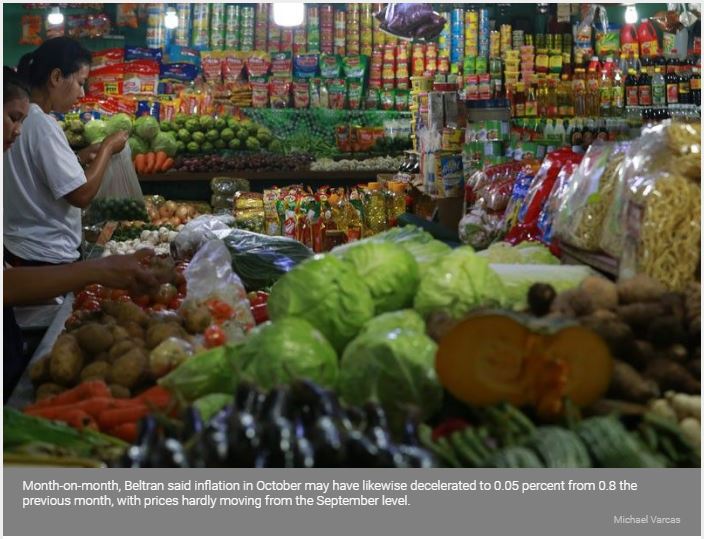Philippines: DOF sees inflation easing to 6.5% in Oct
MANILA, Philippines — Inflation likely slowed to 6.5 percent in October due to declining prices of rice and other food items, according to the Department of Finance.
In his latest economic bulletin, Finance Undersecretary and chief economist Gil Beltran said year-on-year inflation last month may have eased to 6.5 percent from the 6.7 percent recorded in September.
This falls within the 6.2 percent to seven percent inflation forecast range issued by the Bangko Sentral ng Pilipinas.
Month-on-month, Beltran said inflation in October may have likewise decelerated to 0.05 percent from 0.8 the previous month, with prices hardly moving from the September level.
“This development comes as food prices start to stabilize,” Beltran said.
According to Beltran, supply of rice have began to normalize last month with the start of the rice harvest season and the arrival of rice imported by the National Food Authority and the private sector.
He said the vegetable industry has also partly recovered from the prior month’s severe weather disturbances.
“Other administrative streamlining measures signed by President Duterte to boost food supply are underway,” he said.
Beltran said the month-on-month decrease in electricity rates also helped temper the rise in fuel prices last October. Domestic pump prices of diesel and gasoline peaked during the month as Iran sanctions threatened to push up the price of oil in the world market.
Inflation last September accelerated further to a near 10-year high of 6.7 percent from the 6.4 percent recorded in the previous month. The BSP earlier said this may already be the peak for inflation this year.
For the whole of 2018, the central bank sees inflation averaging 5.2 percent. This is expected to slow down to 4.3 percent in 2019 and 3.2 percent in 2020.
The Development Budget Coordination Committee also adjusted the government’s inflation target to a range of 4.8 percent to 5.2 percent for 2018, and three to four percent for 2019.
The government has pursued monetary and non-monetary measures to help ease inflation and address the supply issues that has increased the prices of agricultural products.
On the administrative side, the President issued Administrative Order 13, and Memorandum Orders 26 to 28, which removed administrative restrictions on the importation and release of agricultural products to the market.
Source: https://www.philstar.com/business/2018/11/05/1865872/dof-sees-inflation-easing-65-oct#cY2UfUtMIaPJWwvu.99


 English
English




